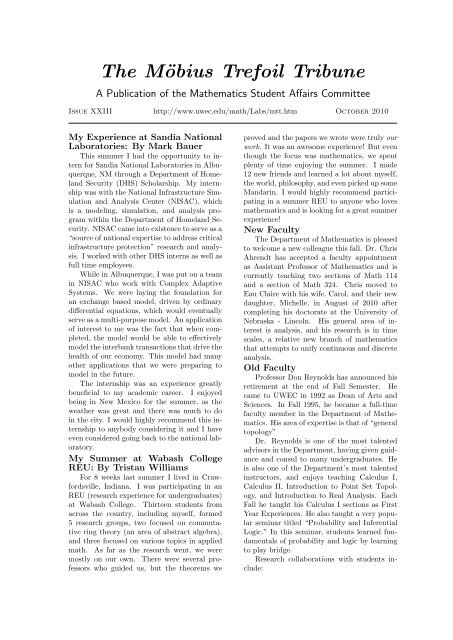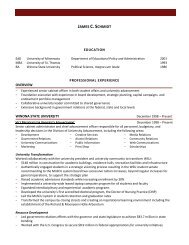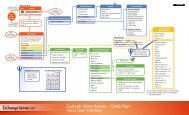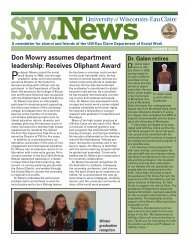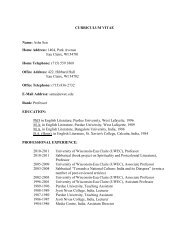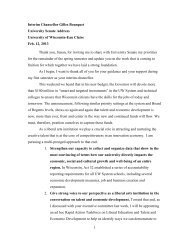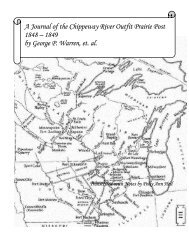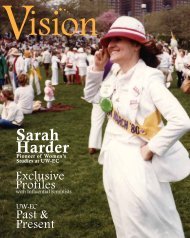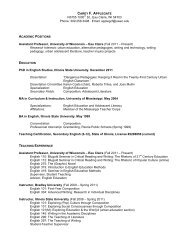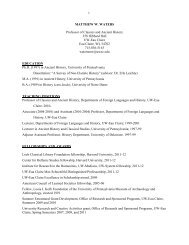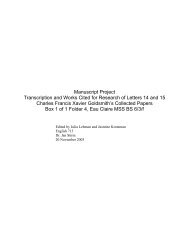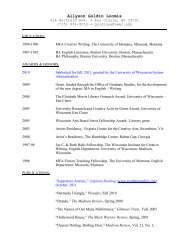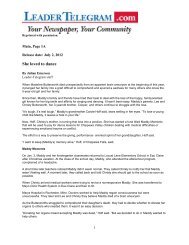The Mobius Trefoil Tribune - University of Wisconsin-Eau Claire
The Mobius Trefoil Tribune - University of Wisconsin-Eau Claire
The Mobius Trefoil Tribune - University of Wisconsin-Eau Claire
Create successful ePaper yourself
Turn your PDF publications into a flip-book with our unique Google optimized e-Paper software.
<strong>The</strong> Möbius <strong>Trefoil</strong> <strong>Tribune</strong><br />
A Publication <strong>of</strong> the Mathematics Student Affairs Committee<br />
Issue XXIII http://www.uwec.edu/math/Labs/mtt.htm October 2010<br />
My Experience at Sandia National<br />
Laboratories: By Mark Bauer<br />
This summer I had the opportunity to intern<br />
for Sandia National Laboratories in Albuquerque,<br />
NM through a Department <strong>of</strong> Homeland<br />
Security (DHS) Scholarship. My internship<br />
was with the National Infrastructure Simulation<br />
and Analysis Center (NISAC), which<br />
is a modeling, simulation, and analysis program<br />
within the Department <strong>of</strong> Homeland Security.<br />
NISAC came into existence to serve as a<br />
“source <strong>of</strong> national expertise to address critical<br />
infrastructure protection” research and analysis.<br />
I worked with other DHS interns as well as<br />
full time employees.<br />
While in Albuquerque, I was put on a team<br />
in NISAC who work with Complex Adaptive<br />
Systems. We were laying the foundation for<br />
an exchange based model, driven by ordinary<br />
differential equations, which would eventually<br />
serve as a multi-purpose model. An application<br />
<strong>of</strong> interest to me was the fact that when completed,<br />
the model would be able to effectively<br />
model the interbank transactions that drive the<br />
health <strong>of</strong> our economy. This model had many<br />
other applications that we were preparing to<br />
model in the future.<br />
<strong>The</strong> internship was an experience greatly<br />
beneficial to my academic career. I enjoyed<br />
being in New Mexico for the summer, as the<br />
weather was great and there was much to do<br />
in the city. I would highly recommend this internship<br />
to anybody considering it and I have<br />
even considered going back to the national laboratory.<br />
My Summer at Wabash College<br />
REU: By Tristan Williams<br />
For 8 weeks last summer I lived in Crawfordsville,<br />
Indiana. I was participating in an<br />
REU (research experience for undergraduates)<br />
at Wabash College. Thirteen students from<br />
across the country, including myself, formed<br />
5 research groups, two focused on commutative<br />
ring theory (an area <strong>of</strong> abstract algebra),<br />
and three focused on various topics in applied<br />
math. As far as the research went, we were<br />
mostly on our own. <strong>The</strong>re were several pr<strong>of</strong>essors<br />
who guided us, but the theorems we<br />
proved and the papers we wrote were truly our<br />
work. It was an awesome experience! But even<br />
though the focus was mathematics, we spent<br />
plenty <strong>of</strong> time enjoying the summer. I made<br />
12 new friends and learned a lot about myself,<br />
the world, philosophy, and even picked up some<br />
Mandarin. I would highly recommend participating<br />
in a summer REU to anyone who loves<br />
mathematics and is looking for a great summer<br />
experience!<br />
New Faculty<br />
<strong>The</strong> Department <strong>of</strong> Mathematics is pleased<br />
to welcome a new colleague this fall. Dr. Chris<br />
Ahrendt has accepted a faculty appointment<br />
as Assistant Pr<strong>of</strong>essor <strong>of</strong> Mathematics and is<br />
currently teaching two sections <strong>of</strong> Math 114<br />
and a section <strong>of</strong> Math 324. Chris moved to<br />
<strong>Eau</strong> <strong>Claire</strong> with his wife, Carol, and their new<br />
daughter, Michelle, in August <strong>of</strong> 2010 after<br />
completing his doctorate at the <strong>University</strong> <strong>of</strong><br />
Nebraska - Lincoln. His general area <strong>of</strong> interest<br />
is analysis, and his research is in time<br />
scales, a relative new branch <strong>of</strong> mathematics<br />
that attempts to unify continuous and discrete<br />
analysis.<br />
Old Faculty<br />
Pr<strong>of</strong>essor Don Reynolds has announced his<br />
retirement at the end <strong>of</strong> Fall Semester. He<br />
came to UWEC in 1992 as Dean <strong>of</strong> Arts and<br />
Sciences. In Fall 1995, he became a full-time<br />
faculty member in the Department <strong>of</strong> Mathematics.<br />
His area <strong>of</strong> expertise is that <strong>of</strong> “general<br />
topology”<br />
Dr. Reynolds is one <strong>of</strong> the most talented<br />
advisors in the Department, having given guidance<br />
and consul to many undergraduates. He<br />
is also one <strong>of</strong> the Department’s most talented<br />
instructors, and enjoys teaching Calculus I,<br />
Calculus II, Introduction to Point Set Topology,<br />
and Introduction to Real Analysis. Each<br />
Fall he taught his Calculus I sections as First<br />
Year Experiences. He also taught a very popular<br />
seminar titled “Probability and Inferential<br />
Logic.” In this seminar, students learned fundamentals<br />
<strong>of</strong> probability and logic by learning<br />
to play bridge.<br />
Research collaborations with students include:
Chaos <strong>The</strong>ory and Equicontinuity (Scott<br />
Larson) Markov Chains and Student Academic<br />
Progress (Jessica Porath)<br />
Exceptional service to the <strong>University</strong> includes<br />
serving on the PEEQ Evaluation Team.<br />
Exceptional service to the Department includes<br />
chairing the Recruitment Committee for several<br />
years.<br />
Pr<strong>of</strong>essor Reynolds will be dearly missed.<br />
(Excuse me Don, I meant “will be missed dearly.”)<br />
New Classes<br />
Two new courses have been added to the<br />
actuarial science curriculum beginning in the<br />
2010-2011 academic year. Math 460: Contingent<br />
Payment Analysis is a three credit course<br />
<strong>of</strong>fered for the first time in the spring semester<br />
<strong>of</strong> 2011. Math 470: Mathematical Models for<br />
Financial Economics is a four credit course that<br />
is being <strong>of</strong>fered in the fall semester <strong>of</strong> 2010.<br />
With the addition <strong>of</strong> these courses, the UW-<br />
<strong>Eau</strong> <strong>Claire</strong> actuarial program includes course<br />
work that prepares students for the first four<br />
pr<strong>of</strong>essional exams sponsored by the Society <strong>of</strong><br />
Actuaries (SOA) and Casualty Actuarial Society<br />
(CAS). In addition, the program meets all<br />
three validation by educational experience categories<br />
as specified by SOA and CAS. <strong>The</strong>re<br />
are currently 17 actuarial programs worldwide<br />
that are designated as Centers <strong>of</strong> Actuarial Excellence<br />
(CAE) and these curricular additions<br />
move the UW-<strong>Eau</strong> <strong>Claire</strong> program closer to<br />
achieving CAE designation.<br />
Class schedule for Spring 2011.<br />
It is time to register for next term. Here are the<br />
upper division mathematics courses for the Spring<br />
Semester <strong>of</strong> 2010.<br />
• Diff. Eq. & Lin. Alg. (mth 312), 4 cr. 12-1<br />
p.m. MWRF, Ahrendt.<br />
• Discrete Mathematics (mth 314/514), 3 cr.<br />
1-2 p.m. MWF, Riehl.<br />
• Intro to Real Analysis (mth 316/516), 3 cr.<br />
10-11 a.m. TuTh, Tong.<br />
• Intro to Complex Variables (mth 318/518),<br />
3 cr. 8-9 a.m. MWF, Smith.<br />
• Abst. Alg. for Teachers (mth 322), 3 cr. 4:30-<br />
5:45 p.m. TuTh, Serros.<br />
• Linear Algebra and Matrix <strong>The</strong>ory (mth<br />
324/524), 3 cr. 2-3 p.m. MWF, Riehl.<br />
• Modern Geometry (mth 330/530), 3 cr. 2-<br />
3:15 a.m. TuTh, Giamati.<br />
• Number <strong>The</strong>ory (mth 341), 3 cr. 10-11 a.m.<br />
MWF, Schoen<br />
• Mathematical Statistics (mth 347/547), 4 cr.<br />
11-12 a.m. MWF & 11-1 a.m.& 1-3 p.m. Tu,<br />
Kraker.<br />
• Intro to Financial Math (mth 350), 4 cr. 10-<br />
11 a.m. MWRF, Whitledge.<br />
• Numerical Analysis II (mth 352/552), 4 cr.<br />
10-11 a.m. MWF, Elgindi.<br />
• Math Modeling (mth 354/554), 4 cr. 9-10<br />
a.m. MTWF, Schoen.<br />
• Patterns <strong>of</strong> Prob Solving (mth 365/565), 3<br />
cr. 11-12 a.m. MWF, Masarik.<br />
• Abstract Algebra I (mth 425/625), 3 cr.<br />
12:30-1:45 p.m. TuTh, Howe.<br />
• Abstract Algebra II (mth 426/626), 3 cr.<br />
12:30-1:45 p.m. TuTh, Duffy.<br />
• Digital Image Processing (mth 440/640), 3<br />
cr. 6-7:15 p.m. MW, Walker.<br />
• Survey Sampling (mth 445), 3 cr. 2-3:15 p.m.<br />
MW, Kraker.<br />
• Teach Math with Technology (mth 451/651),<br />
3 cr. 4-5 p.m. MWF, Hlas.<br />
• Cont. Payment Analysis (mth 460/660), 3<br />
cr. 10-11 p.m. MWF, Presler.<br />
• Special Topics (mth 491), 1-3 cr. Time TBA,<br />
Serros.<br />
• Capstone Seminar (mth 493), 1 cr. Time<br />
TBA, Serros.<br />
Ping-Pong Balls<br />
You are given nine ping-pong balls—<br />
identical in appearance and feel, though one<br />
is slightly heavier than the rest. You have a<br />
simple balance scale (two arms with a pivot in<br />
the middle) to help you determine which ball<br />
is the heavy one. How can you find it using the<br />
scale only twice?<br />
Ask Dr. Math.<br />
Dear Dr. Math<br />
My math pr<strong>of</strong>essors seem to constantly<br />
be giving examples that have nothing to do<br />
with the real-world. Do all mathematicians<br />
sit around creating hypothetical situations<br />
with little real-world application? Or<br />
are there some who can just kick back with<br />
a nice beer every once and a while?<br />
I. Tursty<br />
Dear Tursty,<br />
Of course mathematicians enjoy a good lager as<br />
much as the next chap. In fact, not too long ago<br />
an infinite number <strong>of</strong> my mathematician friends<br />
stepped over to a bar. <strong>The</strong> first went up to the bartender<br />
and said, “I’ll have a pint <strong>of</strong> lager, please.”<br />
Each next one said, “and I’ll have half <strong>of</strong> what he’s<br />
having.” <strong>The</strong> bartender was a bit rude: he replied,<br />
“You’re all idiots,” and grabbed two pints and set<br />
them on the bar.


